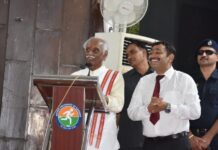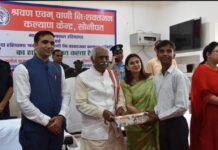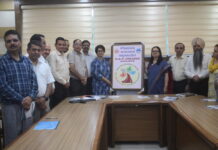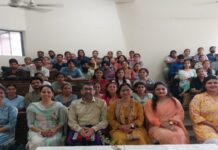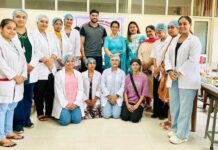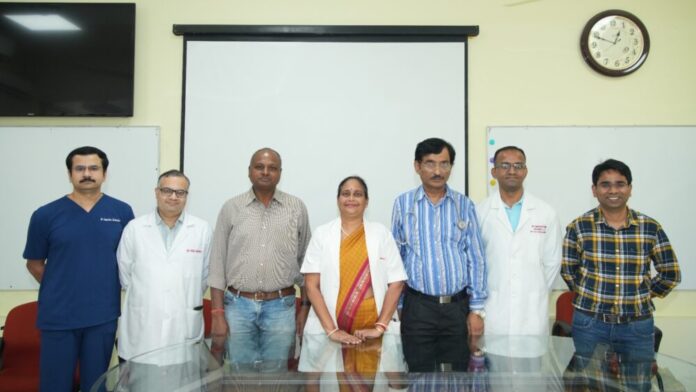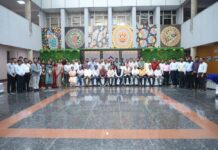8th PGI Gastrointestinal Emergencies Update, 13th to 15th September, 2024
The Department of Gastroenterology, PGIMER, will be conducting a single-theme conference on Gastrointestinal Emergencies between September 13 and 15. This national-level conference will be attended by the faculty and delegates from all over India. The workshop will focus on appropriate and evidence-based management of emergencies related to gastrointestinal and liver diseases.
Gastrointestinal emergencies are an important cause for morbidity and mortality globally. It has been shown that goal-directed management in the golden early hours of presentation can potentially improve clinical outcomes. Gastrointestinal emergencies include those related to gastrointestinal bleeding, acute pancreatitis, complicated gallbladder disease, complications of liver failure (bleeding, infection, hepatic encephalopathy). Apart from these, the focus will also be on the management of patients admitted to the intensive care unit.
Sessions on intestinal obstruction, severe manifestations of inflammatory bowel disease and corrosive ingestion dedicated to emergencies related to GI tract will be held. Most GI meetings tend to focus on a specific disease and the care of emergencies is often ignored in such meetings. Prof Usha Dutta, Organising Chairman and Head of the Department of Gastroenterology, PGIMER, said the 8th edition of this program affirms the commitment of the department in reducing the knowledge gap between first contact doctors who manage patients in emergency and experts.
GASTROINTESTINAL BLEEDING
Gastrointestinal bleeding is an important emergency that can be either from the upper gastrointestinal tract or lower gastrointestinal tract. Upper gastrointestinal tract bleeding can happen for many reasons such as ulcers in the stomach, tear in the food pipe i.e esophagus, rupture of blood vessels in case of chronic liver disease etc. Hence, there will be a special session tailoring how to approach such patients and how to manage them primarily led by Dr Naresh Bhat with Drs Anupam Singh, Vaneet Jearth and Dr Sridhar Sundaram participating as well. Apart from these, there will also be a talk on how to tackle such bleed endoscopically. Additional sessions will include talks on various new modalities and armamentarium available to endoscopists to tackle gastrointestinal bleeding. Prof Saroj Sinha will highlight the role of acid suppression in patients with GI Bleeding.
ACUTE PANCREATITIS
Acute pancreatitis is another gastrointestinal emergency in which primary care physician has an important role to play. Acute pancreatitis is acute inflammation of the pancreas that occurs due to alcohol ingestion, gallstones, very high calcium levels or triglyceride levels. Many cases of acute pancreatitis are preventable through alcohol abstinence and early and appropriate management of gallstones. Once the disease occurs, the initial 72 hours are crucial in the management of acute pancreatitis. Prof Pramod Garg will highlight current literature in this field and there will be a detailed discussion on strategies to improve mortality and outcomes in this serious ailment.
There will also be sessions on liver disease-related emergencies such as acute liver failure, infected fluid (ascites) in the abdomen, kidney and brain dysfunction in patients with chronic liver disease.
ULCERATIVE COLITIS
Ulcerative colitis means ulcers in the large intestine and is a chronic gastrointestinal condition. But, when patients default the treatment, their disease worsens and may present as acute severe ulcerative colitis, a common GI emergency. This is an urgent medical condition and requires prompt goal-directed treatment otherwise serious complications such as toxic megacolon, perforation may occur. There will be panel discussion regarding the same led by Dr Vishal Sharma and he will also try to highlight the management options for difficult patients, who do not respond to steroid therapy. Prof Ajit Sood, Dr Anuraag Jena and Dr Yashwant will also participate in this session.
OTHERS
There are other sessions dedicated to emergencies related to GI tract such as intestinal obstruction, inability to swallow, infection due to obstruction of bile duct and foreign body ingestion. Most GI meetings tend to focus on a specific disease and the care of emergencies is often ignored in such meetings.
Prof Usha Dutta is the chairperson for the conference, while Dr Vishal Sharma and Dr Harshal Mandavdhare are the organizing secretaries. Senior gastroenterologists from across the country, who are experts in the management of gastroenterological emergencies, including Prof Shobana Bhatia, Prof Rakesh Kochhar, Prof Anoop Saraya, Prof Pramod Garg, Dr Ajay Kumar, Prof Amarender S Puri, Prof Ajit Sood, Prof Govind Makharia, Dr Naresh Bhat, Prof Praveer Rai, Dr Vinay Dhir, Dr Mohan Ramchandani among others would be present as faculty for this conference. Delegates include gastroenterologists, trainee gastroenterologists and physicians from across the country.
A hands-on session is being conducted on September 13 at Zakir Hall, in which training on various models and practical clinical situations would be imparted to residents. This session is being led by Dr Jayanta Samanta and Dr Jimil Shah. There will also be a special session on POCUS (point of care ultrasound), which is going to help trainees in managing Gastrointestinal emergencies.
The aim
Patients with gastrointestinal emergencies are often very sick, and need standardized timely approaches to improve outcomes. The meet will focus on providing a platform to enable knowledge transfer from experts to resident doctors and trainees, who are often the first contact physician for patients with gastroenterological emergencies. Rapid advances necessitates that the doctors keep themselves abreast with the latest available evidence in the field. The meet will seek to equip the delegates with the current knowledge and proficiency in procedures that will hopefully translate into better patient outcomes for these conditions. The present meet will also provide an opportunity to update the existing knowledge with recent recommendations and advice provided by the participating experts.


